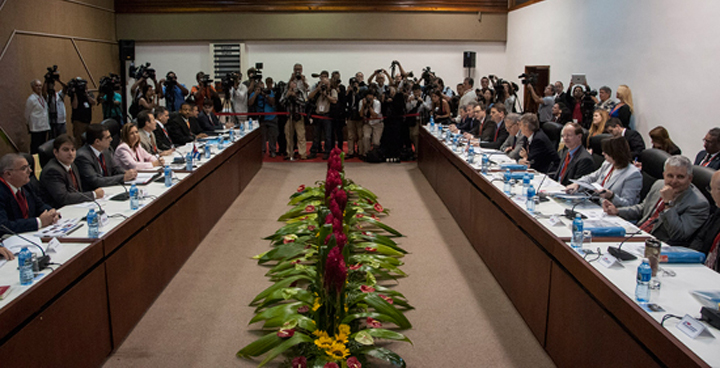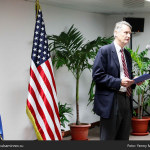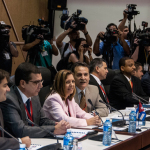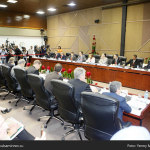
A report on the Cuba-U.S. talks
Progress is made in migration topics but U.S. keeps Cuban Adjustment Act in effect
HAVANA, Jan. 21, 2:30 p.m. — The government of the United States will keep in effect the Cuban Adjustment Act and the “dry-feet-wet-feet” policy, even though both delegations have acknowledged advances in the migratory accords signed by both countries in 1994-95.
Edward Alex Lee, deputy Assistant Secretary of State for Western Hemisphere Affairs and chief of the U.S. delegation to these meetings, told the media that his government “was committed to maintaining the Cuban Adjustment Act.”
However, Lee confirmed “that the talks were held in a constructive atmosphere in a spirit of cooperation” and that the parties could continue to work in that spirit.
He also said that other topics, related to family reunification and the return to Cuba of the so-called “excludable” had been discussed.
Josefina Vidal, director general for the United States at the Foreign Ministry, said that the continuation of the Adjustment Act and the “wet-feet-dry-feet” policy contradicts the essence of the accords signed by both governments to ensure a legal, orderly and orderly migration.
“Only one nationality in the world is given this treatment,” she said.
Elsewhere in her presentation, Vidal expressed Cuba’s unconformity with the continuation of the so-called “theft of brains,” basically in the sector of health care.
Both delegations went on record as expressing their concern over the inability of the Cuban Interests Section in Washington to work with U.S. banks.
As part of this bilateral encounter, future technical meetings were scheduled to deal with migration fraud and exchanges between the U.S. Coast Guard service and the Cuban Border Protection Troops.
Asked about the extradition of the Cuban-born terrorist Luis Posada Carriles and the return of U.S. citizens sought by U.S. justice, Vidal said that those cases had not been dealt with. They corresponded to the second phase of the negotiations, she said.
From statements to the press by the director general for U.S. Affairs at the Foreign Ministry, Josefina Vidal Ferreiro, regarding the 28th round of migration talks between Cuba and the United States.
- We acknowledged the observance of the Migratory Accords as regards the granting of no fewer than 20,000 visas a year by the United States to Cuban emigrants, and the increase of the visas granted to Cuban citizens to make temporary visits to the United States.
- The Cuban side offered information that demonstrates the satisfactory observance of the new procedures of the Cuban migratory policy, which was revised two years ago.
- We acknowledged an increase in the cooperation and communication between the competent agencies of both countries to deal with illegal emigration, the smuggling of persons, and migratory fraud.
- The Cuban delegation proposed to hold, in the upcoming months, a technical meeting between experts on the subject of fraudulent migratory documents.
- We coincided on the favorable results of the profession technical exchanges made recently by SGC of the United States and TGF of Cuba and discussed an expansion of that cooperation.
- Despite the measures taken by both countries, the persistence of the “wet-feet-dry-feet” policy and the Cuban Adjustment Act, which contradict the letter and spirit of the Migratory Accords, continues to be the main stimulus for illegal emigration, the traffic in emigrants, and the irregular entry to the United States from third countries of Cuban citizens who travel legally abroad.
- Not all the illegal Cuban emigrants intercepted at sea are being returned to Cuba, which is contrary to the Migratory Accords.
- We expressed our rejection of the continued policy aimed at encouraging Cuban health-care professionals and technicians to abandon their missions in third countries. It is a reprehensive practice of “brain theft” that in addition attempts to deprive many countries that benefit from cooperation with Cuba from vital human resources. This runs counter to the current bilateral context of relations between Cuba and the United States.
Havana, 21 January 2015
U.S. DEPARTMENT OF STATE
For Immediate Release
January 21, 2015 Havana
STATEMENT BY ALEX LEE,
DEPUTY ASSISTANT SECRETARY OF STATE FOR WESTERN HEMISPHERE AFFAIRS
Migration Talks with Cuba
Today, January 21, 2015, U.S. and Cuban officials met in Havana to discuss technical issues related to the Migration Accords of 1994 and 1995 between the United States and Cuba. The Cuban delegation was chaired by the Foreign Ministry’s Director General for U.S. Affairs, Josefina Vidal Ferreiro. I led the delegation for the United States. The United States hosted the last round of these semi-annual talks in July 2014 in Washington.
The United States and Cuba restated their commitment under the Migration Accords to ensure that migration between the two countries remains safe, legal and orderly. They also agreed to regularly review the implementation of these Accords. Continuing to ensure safe and legal migration between Cuba and the United States is consistent with our interest in promoting greater freedoms and increased respect for human rights in Cuba.
The productive and collaborative nature of today’s discussion proves that, despite the clear differences that remain between our countries, the United States and Cuba can find opportunities to advance our mutually shared interests as well as engage in a respectful and thoughtful dialogue. In addition to discussing the bilateral implementation of the Migration Accords, we exchanged ideas on other aspects of safe migration, such as the return of Cuban Excludable Aliens, the Cuban Family Reunification Parole Program, and the monitoring of repatriated Cuban nationals.
These were the first Migration Talks held after the changes in the direction and tenor of our bilateral relationship that were announced last month by our nations’ presidents. They reflected this new emphasis on engagement and dialogue. We look forward to continued progress on the issues we covered today.
###
HAVANA, Jan. 21, 11 a.m. — “A fruitful morning” was the description by Gustavo Machín, deputy director for U.S. Affairs at the Cuban Foreign Ministry, of the first moments of the conversation and discussions about migration with the U.S. authorities present in this capital city.
In a brief encounter with the press, Machín said that the atmosphere was “cordial, with very fluid understanding” but added that there were, in some cases, different points of view that were the subject of discussion.
For example, he cited the topic of the Cuban Adjustment Act, which had been “placed on the table.”
“We’re in accord on some points, not on others,” the functionary said during a briefing lasting less than two minutes at the Palace of Conventions in Havana.






